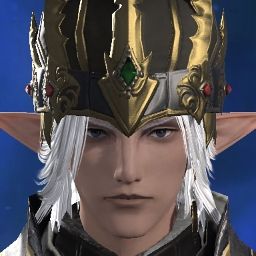So after doing the differing quests in ishgard as a few classes that give you an idea of their military, here is my take on it. Warning, there will be some mild to moderate spoilers and this will be a pretty long post.
The highest power in Ishgard is the church, currently lead by Aymeric and his Temple Knights. From what we've seen so far, the Temple Knights don't appear to owe any allegiance to the four houses, in the case of the 12 knights serving Pope Thordan, they actually appeared to think themselves above the rules and did whatever they want, due to their station no one was willing to say anything. But I don't see that happening with Aymeric though, he appears willing to fight and make sure that his soldiers don't act like that. The Temple Knights appear to be the peacekeeping/police force in Ishgard, the guards we see in Pillars I interpret as each House wanting to make sure that they have their own loyal soldiers guarding their homes rather than the Temple Knights. The four houses also appear to have their own specific designations and duties as well, like how a Fortemps noble runs Camp Dragonhead, Dzemael is well known for building fortifications, and Haillenarte is in charge of Camp Cloudtop.
But there are rivalries in the Houses, during the Machinist story you get a good idea of how the nobles view commoners and the thought of arming them, the main protagonist makes his disdain for them very clear but since he can't directly shut them down, he resorts to sabotage, hostages, and accusations of heresy. Despite knowing full well that he's responsible however, because there is no visible proof or evidence of such behavior, the temple knights aren't able to do anything. So given that, it appears that the soldiers answer to their own House first above all other things as it appears the knights we meet have no issue engaging in any type of behavior (hostages, sabotage, etc.) so long as they are ordered to do so.
Unrelated, the above I feel is a missed opportunity in the storyline and I'm going to mention it here because it still bugs me. The paladin is meant to be a knight that protects the common man rather than answer to a noble house that might ask them to do something deplorable to suit their interests. Having the paladin work on reforming a corrupt knight of some kind could have been a nice theme to explore. But I digress.
We also learn in the Dark Knight story about the Inquisition, the big focus on an Inquisitor hunting a girl. She throws tons of soldiers after you, in the final quest I think you end up killing something like 20-30 of them and even after that she vows to continue hunting the girl at all costs, the Inquisition also appears in the Mch story to address the accusations of heresy. The Inquisition appears to be able to recquisition soldiers whenever they need them as long as they have a legitimate cause on paper, we also learn in the new Hildibrand quest from the Inquisitor NPC that they are starting to lose funding and influence as there have been much less cases for them to deal with.
The Inquisition seem to be the judge and jury in Ishgard society, we see that during the Mch story and the Botanist story as well, they also appear to be very fond of the whole trial by combat thing, but some of them do have some emotion to their behaviors and will consider changing their minds such as what happens at the end of the Btn story where an Inquisitor is so moved by something he appears to change his mind about the whole heresy thing. Malicious accusations of heresy seems to be a popular theme in a lot of the stories, you'd think the Inquisition might start to wonder a little bit?
There are also the common soldiers, part of the Convictory chain quests show some of the common soldiers wanting to kill large dragons because it will earn them fame and recognition. It also provides an interesting incentive, given the nobility's disdain that we see (Mch story) and that capable commoners are elevated and given rewards (convictory storyline) it provides a fairly strong motivation for the commoners that have no prospects in life to join the military. It seems a fair gamble, you can risk freezing to death in the poor sections of Ishgard or join the House militaries and attempt to kill the dragons as a way to earn fame and recognition. Estinien was of common birth (drg story) but because of his skill in combat he was given a great deal of leeway, he appeared to come and go as he pleased and no one really ever said anything to him.
Another thing about the common soldiers you learn is over the course of the storyline for Miner from 50-60, you are given tasks to assess various areas for rare types of ore, but because a lot of the Ishgardian soldiers thought it was "beneath them" they hire a mercenary team to guard the mining expert doing the job (i.e. you the player character). With that it also lead me to the conclusion that if it doesn't involve fighting the Dravanians directly or doing something that doesn't contribute directly to personal glory or standing for their House, the Ishgardians would rather have mercenaries handle it. I was also given the very strong impression from the Mining quests that the Ishgardians regard the mercenaries as a completely expendable resource and that if you and the mercenaries had died in the process they'd just hire another bunch of guys to take care of it.
The Mch story also addresses a lot of the Ishgardian viewpoints on arming the commoners, the nobles have a very strong notion that combat with the Dravanians should only be done by the strong arms of armored knights. The noble sons are also expected to be knights of great personal skill and the only way to earn glory for the Houses is to lead from the front and kill dragons. Proposing something new makes the knights very uncomfortable. Actually, I highly recommend leveling Mch to 60, the story provides a very interesting look in to the views of the nobles about combat as a whole.
That about sums up my understanding of the current Ishgardian military.
Thread: Ishgard's military
-
02-27-2016 05:48 PM #11(3)

-
02-27-2016 06:25 PM #12
Let's see if I got this right. So, to summarize:
- A commoner can become a dragoon, especially if their parents are killed by dragons or a dragoon adopts the orphan.
- A commoner can become a knight of the High Houses if they kill a dragon and bring proof of the deed.
- A commoner could technically become part of Heaven's Ward if they graduate from Scholasticate and are chosen over the nobles? Think there was something about only certain amount of people that were chosen by the Vault. Need to check on that...
- Armed commoners are frowned upon except the Dragonslayers who keep to themselves. (This slowly changes after Stephanivien's efforts.)
- Nobles are expected to become knights.
(... Reminds me. What about Francel? Stephanivien and Laniaitte - who works at Sea of Clouds - are expected to be knights by the Count.)
- High Houses are known to take wards, especially Haillenarte.
What I still want to know:
- How do knights of the High Houses identify themselves as? This probably isn't right at all, but do they add "de Haillenarte" or somesuch to their names as well?
- The ranking system... Is it any way similar to GC? I think the hyur at Falcon's Nest was called liutenant, but I'm not 100% sure.
- Who become temple knights? Just your avarage nobles that aren't part of the four High Houses? That can't be right, though... Aymeric and Estinien were shown to wear temple knight gear in one of the short stories. Or was the whole Dragonslaying thing so that they could become temple knights instead of catch the attention of the four High Houses?(0)
-
02-27-2016 06:44 PM #13Player

- Join Date
- Sep 2013
- Location
- Gridania
- Posts
- 1,966
- Character
- Kai Magnus
- World
- Leviathan
- Main Class
- Dragoon Lv 90
Temple Knights = Cops +SWAT+National Guard
Inquisition = Secret Police
House Knights = Personal Armys of Nobelmen (Being a noble house, all members are bloodnrelated so "Of house <clan name>" allows The Branch Families to have identity)
Dragoons = Anti Dragon Taskforce
Heaven's Ward = Pope's private Gestapo.
Armed citizen bad, Ego Stroking Noble Good, Burn The Dragon sympathisers, Noble's make the laws, and DRKs hold them to it.
Ishguardian Plotics 101(3)
-
02-27-2016 07:16 PM #14
Damn, forums ate my post, it was a good one to. This one won't be as good but I'll do my best!
As far as Francel goes, he still appears to be on the young side and in the Scholasticate we see nobleborn men and women alongside commoners. So it is my belief that the Ishgardian nobles have a choice of either becoming knights or priests, however in various parts of Ishgard we see some noblewomen mention their relatives or their sons and how they died fighting the dragons. So for the girls I believe the expectation is that they will become knights or priests and/or pop out kids to continue Ishgard's legacy. Steph's dad views his son's whole manufactory/engineering thing as just a bad hobby or a phase he's going through and at first clearly expects him to eventually outgrow it and become a knight even if Steph says straight out that's not very good with a sword or whield.
It also appears that the Ishgardians don't have a problem with their nobles marrying regardless of profession, in the Drk storyline we learn that an Inquisitor got married and had a daughter, it appears to be perfectly acceptable to them so their clergy clearly doesn't have any kind of expectation of chastity or anything like that.
As for the Knights identifying themselves, it appears that visually that's with done with armor and they address each other and introduce themselves as "ser" or "lord." With the whole "de Fortemps" and "de Haillenarte," I believe that is meant to identify them as being part of the "main" bloodline of the House. When it comes to the ranking system, I'd say no, it wouldn't be anything like the GC system, based on how Ishgard's noble Houses are and what we see, the ruling Lord of the House appears to be the first and last word on issues.
Based on that I believe the authority flows downwards, that is to say, the Lord holds absolute power and it's up to him to assign the soldiers. Count Edmont acts as ruler of his house and Artoirel is his second in command, I assume that nobles would assign a group of soldiers and would (ideally) choose their leaders based on that person's abilities and skills. In the fishing storyline from 50-60 for example you learn that a noble house has two sons, an older and a younger, once the older one disappears the younger one becomes a cruel tyrant and is basically running the house in to the ground but because of his authority no one can stop him.
So for the commoners proving themselves, it's my belief that a commoner that shows themself to be a capable dragonslayer will most likely receive a field promotion from their commanding noble, whoever that may be. So for the commoners to receive a promotion, I'd call it a Dragonslaying Meritocracy with the ones showing themselves to be the most talented being given command. For the nobles I imagine there's a whole layer of infighting, toadying, and politics that we don't really see on the surface.
For the Temple Knights, first thing I'd say is that based on Ishgard's highly political culture, there wouldn't be any unaligned noble families, it's my belief that they would all have to declare their loyalty to a house for their own survival. As for who becomes Temple Knights, we're not really given a clearcut answer to that and we don't meet many that really explain it. Aymeric for example was a bastard child rumored to be son of Pope Thordan, but despite that bloodline he was described as having displayed skill and talent from a young age and his position was earned despite him presumably having no ties to any noble family (that we know of), once again showing me that a lot of Ishgard is meritocracy based.
That leads me to believe that anyone, commoner or noble, could become a Temple Knight if they show sufficient skill. Since the Temple Knights act as the arm of the church though, my first guess would be that those that are particularly attracted to join would be those that want to serve Halone/the church directly rather than answer to the four noble houses. Since worship of Halone is so deeply ingrained in their culture, I'm of the opinion that a lot martially inclined Ishgardians that are really pious would jump at the chance to serve the church directly. Also, since Aymeric was a bastard child that rose to such a place of prominence, I could definitely imagine some commoners would see it as a way to rise in power without being subject to the whims of the noble families.
Edit:
I wouldn't say the Inquisition is a "secret" police. They are very visible and every Ishgardian seems to be aware of them. The Drk's also don't really hold the people to the noble's laws, the dark knights appear to act out of their own sense of moral codes, we learn the first one murdered a priest that was a pedophile, even though it was an open secret, there was no "real" evidence to that effect but he did it anyway. You also learn from Sidurgu that the drk that taught him slaughtered a bunch of Ishgardian knights that were murdering the innocents in Sidurgu's village. The dark knights operate outside of any real law and act on their individual sense of morals, I generally hate analogies but in this case, the dark knights are supposed to be like Batman, operating outside of the law to do the right thing.(2)Last edited by Khalithar; 02-27-2016 at 07:22 PM.
-
02-28-2016 02:17 AM #15Player

- Join Date
- Sep 2013
- Location
- Gridania
- Posts
- 1,966
- Character
- Kai Magnus
- World
- Leviathan
- Main Class
- Dragoon Lv 90
The Inquisition as in the manner of a secret police because when they are on a mission, laws, rights, and human decency be damned. They'll literally do anything and use anyone to accomplish their goal. The CIA, MI6, and FSB all work in similar manners since they act in the name of the Law's Writers but are still almost completely immune to it.
And I didn't mean Dark Knights held NORMAL people to laws. That's what the Temple Knights and Inquisition are for.
No the Dark Knights hold The Temple Knights, Inquisition, Clergy, and Nobel Houses to the laws when the former deam them selves above it.
A "public Official" that takes "Indecent Liberties" of any form will soon have a Dark Knight knocking down his door. Hmm, that could be warning motto after Aeymeric's reformation is completed.(0)
-
02-28-2016 03:08 AM #16Player

- Join Date
- Jul 2015
- Posts
- 1,217
- Character
- Ashe Sinclair
- World
- Phoenix
- Main Class
- Thaumaturge Lv 60
The Archbishop rules over the Heavens' Ward and the Vault, and the Temple Knights (and the Inquisition) serve the Vault. Anyone of Ishgardian birth can become a Temple Knight, yet while it's possible to advance your position through slaying infamous dragons and the like, only the aristocracy ever really reach ranks of prominence.
(0)Last edited by Lunaxia; 02-28-2016 at 03:11 AM.






 Reply With Quote
Reply With Quote





